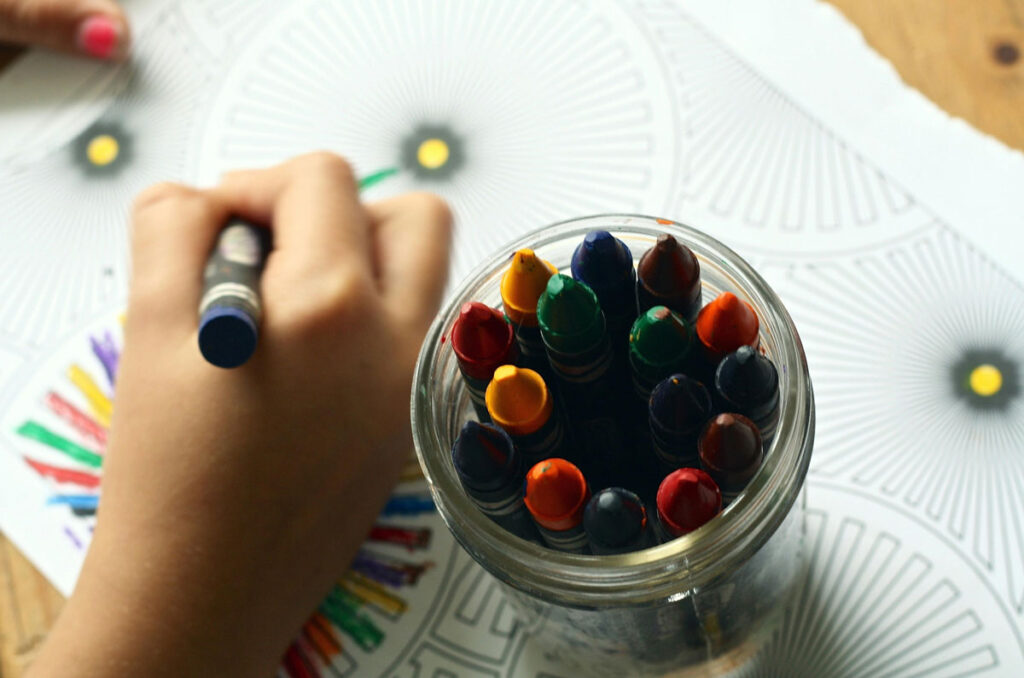Many parents come to us with concerns about their child’s development, wondering if and how paediatric occupational therapy might help.
Whether you’re familiar with OT or are just starting to explore its potential benefits, we’ve created this blog post to take you through what it is, its benefits, and why your child might need it.
Our team of occupational therapists have gotten together to share their experiences with paediatric occupational therapy and how it can support so many different children — especially those with different needs.
So, why would a child need occupational therapy? Let’s get into it.

Occupational therapy sets children up with the skills they need for life
At its core, paediatric occupational therapy (OT) is about creating and nurturing the skills that enable children to perform daily activities and engage in their world fully. Occupational therapists are kind of like skill builders. We assess and address both physical and cognitive challenges, then work with children to build the skills to address those challenges.
Through a mix of science-driven and creative approaches, they aim to enhance a child’s ability to participate in everyday tasks. From dressing and eating to attending school and playing with their peers.
For many children, especially those with special needs, OT is not just beneficial. It’s essential. It provides the tools to navigate their environments, interact with others, and meet their personal and educational goals. The therapy is tailored to each child’s unique situation, focusing on developing fine and gross motor skills, sensory integration, coordination, and problem-solving abilities.
Paediatric occupational therapy goes beyond physical and cognitive development. It plays a critical role in building emotional and social skills. These skills are just as important for a child’s success and well-being. Therapists work closely with children to boost their confidence and self-esteem, helping them overcome obstacles and build resilience.
The role of occupational therapy in child development
Paediatric occupational therapy plays a vital role in a child’s developmental journey, particularly in how they learn to navigate the world around them. For many children, development is a smooth process of learning and growth. However, some children face unique challenges that can hinder their ability to perform everyday tasks that are often taken for granted. This is where occupational therapy steps in, providing interventions to help bridge the gaps in a child’s development.
Occupational therapists are highly skilled professionals who specialise in helping children enhance their cognitive, physical, sensory, and motor skills. They ensure that a child can participate in daily activities at home, in school, and in their community.
Here’s how OT can make a big difference for your child.
Enhancing fine & gross motor skills
Occupational therapists work with children to develop fine motor skills and gross motor skills. Gross motor skills involve larger movements using arms, legs, feet, or the entire body (like crawling, running, and jumping). Fine motor skills involve smaller actions using the hands and fingers (like writing, cutting, and buttoning). These skills are crucial for independence in all stages of life.
Improving hand-eye coordination
Through targeted activities, OT helps children improve their hand-eye coordination, enhancing their ability to perform tasks such as catching a ball, building blocks, and writing. This is not only vital for academic success but also for engaging in play and sports with peers.
Developing problem-solving skills
Paediatric occupational therapy helps children learn how to approach and solve problems, enhancing their ability to function independently. This includes learning how to adapt to new situations and think critically about navigating challenges.
Promoting sensory processing
Many children struggle with sensory processing issues, affecting how they experience touch, sound, sight, and movement. Occupational therapists have specialised training in sensory integration therapy. This helps children process sensory information more effectively, improving their concentration, focus, and daily activities.
Supporting emotional and social development
Emotional and social skills are integral to a child’s development. OT provides children with the tools to understand and regulate their emotions, develop empathy, and build relationships. Therapists also offer strategies that help children cope with frustration, anxiety, and social isolation, fostering a sense of belonging and well-being.
Enhancing cognitive skills
Occupational therapy aids in developing cognitive skills like attention, memory, and organisation. These skills are essential for academic achievement and everyday functioning.
Occupational therapy is about developing the skills that allow your child to enjoy a full life. It allows them to get involved and participate in all aspects of life’s activities. Seeing this can be really rewarding for parents.

Occupational therapists can support children with a range of disabilities and symptoms
Paediatric occupational therapy can support so many different children with a wide variety of goals.
Developmental delays
Occupational therapy can provide necessary support if a child is not reaching developmental milestones at the expected age.
Learning difficulties
An occupational therapist might help children struggling with academic tasks at school develop strategies for overcoming these challenges.
Sensory Processing Disorders
Some children have difficulty processing sensory information like touch, movement, sight, and sound. OT can help them manage these challenges.
Autism Spectrum Disorder (ASD)
Children on the autism spectrum can benefit from OT to improve their social, cognitive, and motor skills.
Attention Deficit Hyperactivity Disorder (ADHD)
OT can help children with ADHD enhance their focus, organisation, and coping skills.
Physical disabilities
OT assists children with physical disabilities to improve their motor skills and learn to adapt to daily life tasks.
Coordination problems
For children struggling with balance and coordination, an occupational therapist can step in to help.
Difficulty with fine motor skills
OT can prove beneficial if a child has trouble with tasks such as writing, buttoning their clothes, or tying their shoelaces.
Feeding and swallowing disorders
An occupational therapist can provide strategies to children experiencing difficulties with eating or swallowing.
Behavioural or emotional problems
Children dealing with emotional disorders or behavioural issues can receive support and coping strategies through OT.
So, how do you know if your child might benefit from seeing an occupational therapist?
Here are some indicators that could suggest your child may need occupational therapy support:
Challenges with daily activities
If your child struggles with basic self-care tasks like dressing, using utensils, grooming, or organising their belongings, these might be signs they could benefit from OT. Difficulty in performing age-appropriate activities smoothly is often a clear sign your child might benefit from occupational therapy.
Poor coordination
Watch for signs of clumsiness, frequent tripping, or difficulty navigating stairs. A child who often drops things or seems awkward in their movements might have motor coordination issues that an occupational therapist can help improve.
Behavioural issues
Sometimes, challenges in managing emotions or behaviours in social settings can be linked to underlying sensory processing issues. If your child seems overly sensitive to sensory stimuli like noise, touch, or light or, on the other hand, seeks excessive sensory experiences, OT might be necessary to help manage these sensitivities.
Learning difficulties
If your child faces challenges at school, particularly with handwriting, paying attention in class, or following instructions, these could be signs of developmental delays that occupational therapy can address.
Social challenges
Difficulty interacting with peers, not engaging in group play, or struggling to understand social cues can sometimes be due to underlying developmental issues. OT can help children develop the skills to interact more effectively with others.
Delayed milestones
If your child has hit developmental milestones later than expected—such as crawling, walking, or talking—this might indicate the need for additional support like OT.
Emotional outbursts or frustration
A child who gets easily frustrated, especially with tasks that require fine motor skills or coordination, might benefit from occupational therapy. This can often be a sign that they are struggling with underlying issues that make these tasks more difficult for them
A word from our Directors, Luke and Amy
“At Adapt and Learn, we firmly believe in empowering every child to reach their full potential in life. We love the tangible results we see from occupational therapy and our OTs create a really fun and engaging environment for children to grow in.”

How occupational therapy at Adapt and Learn works
Adapt and Learn provides personalised occupational therapy to children at our purpose-built facilities or in your home. This service is part of our commitment to making accessing the right support simple for families. You can learn all about how our service is delivered on our Occupational Therapy page.
Occupational Therapy offers so many long-term benefits
Improved self-esteem and confidence
As children master new skills and become more proficient in their daily activities, they naturally develop stronger self-esteem. Occupational therapy helps children overcome obstacles that previously stood in their way, boosting confidence that affects all areas of their lives.
Increased independence
One of the primary goals of OT is to increase a child’s independence. By improving skills necessary for daily living, such as dressing, feeding, and personal hygiene, occupational therapy helps children become more self-reliant. This independence is crucial as they grow and start to navigate the world more on their own.
Enhanced social skills
Through occupational therapy, children learn important social skills such as taking turns, sharing, and responding to social cues. These skills are essential for building friendships and interacting effectively with peers and adults, which are important for personal and professional success in later life.
Increased Quality Family Time
Parents and caregivers can regain some freedom as children become more capable and independent. Families often find that as their child’s functional abilities improve, they can enjoy more quality time together rather than focusing solely on caregiving.
Long-term well-being and quality of life
Paediatric occupational therapy addresses the immediate challenges children face and contributes to their long-term well-being. With enhanced skills and confidence, children are better equipped to face life’s challenges and make the most of opportunities. This holistic approach to child development helps ensure a higher quality of life, both now and in the future.
—
Do you think your child might benefit from paediatric occupational therapy? Request a callback to speak with the Adapt and Learn team.
